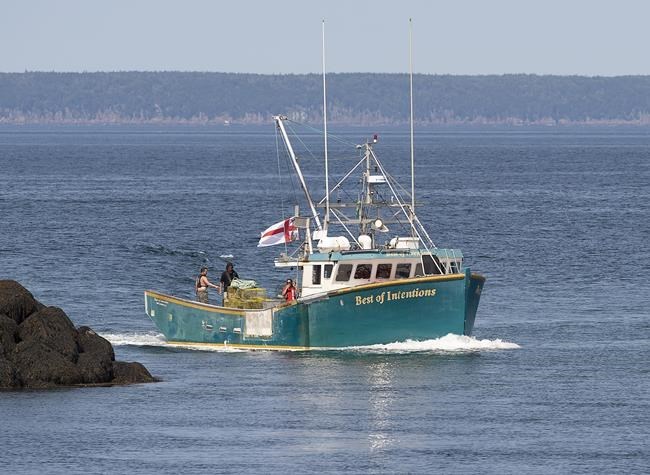OTTAWA — A new report from the Senate is calling on the federal government to implement Mi’kmaq, Wolastoqiyik and Peskotomuhkati rights-based fisheries on Canada's East Coast and overhaul its approach to negotiations.
One of the report’s 10 recommendations is that discussions with First Nations be immediately transferred to Crown-Indigenous Relations from the Department of Fisheries and Oceans, which is something Indigenous communities have been calling for.
"The committee found that Fisheries and Oceans Canada has not been an effective lead negotiator regarding the implementation of rights-based fisheries," the report says. It suggests DFO can act in an advisory capacity.
The Senate's fisheries and oceans committee was asked to study the issue in February in response to violence that first erupted in southwest Nova Scotia in September 2020.
At the time, fishers from Sipekne'katik First Nation began hauling lobster outside of DFO's regulated commercial fishing season, claiming they had a treaty right to fish that was affirmed by the Supreme Court's Marshall Decision in 1999.
That decision affirms that First Nations fishers have a treaty right to fish for a moderate livelihood, although the report notes that Canada has never defined what constitutes a moderate livelihood, which has slowed negotiations with Indigenous communities.
The federal government has also refused to negotiate moderate livelihood fishery deals unless they are constrained within its regulated commercial season. The Senate committee says Indigenous rights-holders also have the right to co-manage and co-govern the fisheries.
"Seasonal limits and other restrictions cannot continue to be imposed unilaterally," the report says.
Local commercial fishers in Saulnierville, N.S., responded with anger to Sipekne'katik's self-regulated fishery in 2020, leading to several days of violent clashes as non-Indigenous people destroyed First Nations catch and burned down a lobster pound.
The report says the public perception of what happened — including that of commercial fishers — was shaped by misinformation and contradictions that at times came from government.
Since then, there has been increased enforcement by DFO and the RCMP in the area.
DFO issued a reminder on Monday that First Nations have the right to fish for limited purposes outside federally regulated fishing seasons, adding that hefty fines await those who prevent them from exercising that right.
While the federal government acknowledges the rights of Indigenous people to fish for food, social and ceremonial purposes, it will not allow them to sell that catch. In April and May, three people and a business were fined a total of over $100,000 for selling lobster caught under these licenses.
To address issues with enforcement, the Senate committee says an expert panel should create a report about "the prevalence of institutional and systemic racism" in DFO, the RCMP and other agencies. It wants that report tabled in Parliament within a year.
The committee says future work should be based on "true collaboration and a shared decision-making framework."
The report defines rights-based fisheries as those based on Aboriginal and treaty rights, which "must be under the sole jurisdiction of Indigenous Peoples."
It further states that this does not mean Indigenous people don't have a right to access commercial and recreational fisheries as well.
It recommends reallocating some existing commercial fishing quotas to Indigenous communities and integrating Indigenous knowledge in conservation efforts.
The report says the government should implement a three-step plan, beginning with co-operating with all three First Nations groups to review and change "all relevant laws, regulations, policies, and practices regarding rights-based fisheries" to ensure they're in line with the Constitution and the UN Declaration on the Rights of Indigenous Peoples.
Next, it says Canada should negotiate nation-to-nation agreements, and finally, create a legislative framework that allows for the implementation of rights-based fisheries.
This report by The Canadian Press was first published July 12, 2022.
The Canadian Press



